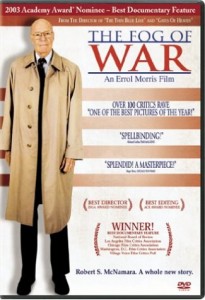
The Jonah Paradox, as conceived in Dupuy’s The Mark of the Sacred, is the existential mission of talking about the apocalypse, despite yourself, as if the inevitability of the apocalypse is written into the stone tablets of fate. Paradoxically this is done in the hope of indefinitely deferring the apocalypse.
This paradox is something we need to come to terms with not only in the face of the Paris Attacks, but also in the face of the West’s unlimited military power. The Paris Attacks only remind us how much we are living on borrowed time.

Borrowed time . . . In one of the most frightening monologues captured on film Robert McNamara says the following about fallible man’s limited capacity for avoiding destruction in the documentary The Fog of War:
Any military commander who is honest with himself, or with those he’s speaking to, will admit that he has made mistakes in the application of military power. He’s killed people unnecessarily — his own troops or other troops — through mistakes, through errors of judgment. A hundred, or thousands, or tens of thousands, maybe even a hundred thousand. But, he hasn’t destroyed nations. And the conventional wisdom is don’t make the same mistake twice, learn from your mistakes. And we all do. Maybe we make the same mistake three times, but hopefully not four or five. There will be no learning period with nuclear weapons. You make one mistake and you’re going to destroy nations.
He goes on outline the limits of rationality when confronted by the gravity of such a situation:
Elsewhere in The Fog of War McNamara says humanity needs to think about how war and technology interact. He says need to look honestly at our capacity for wiping out whole populations.
Now, there are plenty of, as yet unsubstantiated, rumors about the possibility of the Paris Attacks terrorists using widely available encryption technology to mask their plans from French authorities. Given the fact of human fallibility there is no reason to reject the possibility that such groups will get their hands on nuclear weapons in the near future.
What do we do when that genie comes out of the bottle? How does one negotiate with such groups when McNamara says supposedly rational Western actors were incapable of stopping themselves going to the brink of blowing the whole thing up to smithereens? Attacking the rouge groups with nuclear capabilities will only detonate their weapons. This is a possibility that must be countenanced, even as we must pray to be never faced with it. It is where technology has brought us. Philosophy has not caught up with it.

The philosopher of science Mary Midgley, in an interview about her book Are You an Illusion?, appraises the contemporary self-understanding of science and philosophy’s perennial late-coming to interpreting it:
Q: What does it mean to say that science is a form of metaphysics?
A: I take it that `science’ here means `physical science’, not just systematic thinking in general? If so, then saying that it is a “a form of metaphysics” seems to be just a mistake. The speaker’s idea is probably that `science’ on its own can supply its own conceptual background – the set of assumptions needed for its work – so that no philosophical thinking is needed here.
This can’t be true, since concepts – structural ideas such as mind and body, force, time, life and causal necessity – are not physical items.
What is involved here is not just a tribal dispute between two sets of academics. Reflection about these background assumptions is philosophical work whoever does it. The many great scientists, from Newton to Einstein, who have always dealt with philosophical questions have known this well. It is only lately that scientific training has become so one-sided that the crucial function of philosophy within it has been forgotten.
Dupuy’s The Mark of the Sacred explains this dismal state of affairs by the rampant market logic that’s been so frequently condemned by the Church:
The debilitating character of specialization is largely responsible for this alarming state of affairs. Scientific, technological, and industrial rivalry now occurs on a global scale, and any company or research laboratory that is not propared to compete on these terms is bound to perish. The best way to protect oneself, in science no less than in business, is to specialize to the highest possible degree. The consequence of this is that each researcher knows an enormous amount about an ever smaller area of his field. In the whole world he may have at most a dozen or so peers, who are also rivals. There is no point wasting valuable time to learn the history of his discipline if science, as most scientists, believe, progresses asymptotically toward the truth and the only relevant truths are the most recent. Examine the bibliographic references of a typical scientific articale and you will have the impression that science began three years ago. But in order to for any intellectual pursuit to becme a public activity, a part of general culture, it must be at least able to turn its gaze upon itself, and also to accept that not everything lies within its field of competence.

As a lifelong participant in several scientific disciplines the author of The Mark of the Sacred comes to the following conclusion about the common good:
Hypercompetitive–which is to say hyperspecialized–science can hardly contribute anything of value to a generally shared sensibility that might, in its turn, shape society’s capacity to act upon itself for the good.
This is not a rosy picture to countenance. but it is true. Dupuy proposes something he calls the Jonah Paradox (paradoxically speaking of the end as if it is accomplished in he hope of delaying it) as a partial solution to this impasse:
The distinctive form assumed by self-refutation in this case is typical of a whole series of paradoxes to which I have given the fine name of Jonah–in reference not only to the twentieth-century German philosopher Hans Jonas, but also to his predecessor in the eight century BCE, the biblical prophet Jonah. Both were faced with the same dilemma, the very one that confronts every prophet of doom: he must foretell an impending catastrophe as though it belonged to an ineluctable future, but with the purpose of ensuring that, as a result of his doing just this, the catastrophe will not occur.
As St. John Paul II said in a snippet from a speech made at Hiroshima in 1980 that I picked up from Paul Virilio’s Negative Horizon:
Nuclear holocaust threatens. In whose political interest could there ever be a new war?
I don’t want to be saying these things! Frankly, I feel very uncomfortable saying them. But, take a good clear look at how the Curse of Cain brings us to the edge of borrowed time . . .
If you dare to look at how, according to historian of the Holocaust Timothy Snyder, the present historical situation mirrors the historical period that brought us the incomprehensible destruction of World War II, then look at my piece A New Springtime for Hitler?
I pray all of this insanity has not left you depressed, but if it has . . . then Walker Percy says you have every right to be depressed.
I’m also in a financial bind until my first paycheck. Help me avoid a financial apocalypse with donations through the PayPal button on my homepage!












